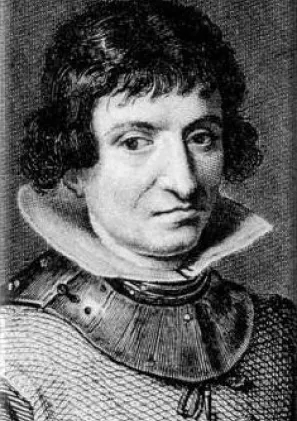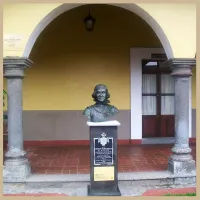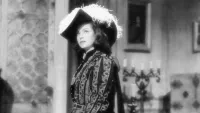Biography
1592 - 1650
Assigned female at birth, Antonio de Erauso was raised in a convent, destined to become a nun – until he turned 15 and set out to escape for a life of adventure. He cut his hair short, donned masculine clothing, adopted a series of male names to travel through Spain, and eventually set sail for the New World in pursuit of fame and wealth; which is how Second Lieutenant Antonio de Erauso came to fight in the wars against the Araucanian Indians in Chile. Upon his return to Spain, de Erauso successfully petitioned the Spanish Crown for compensation for his heroic services before penning an incredible memoire. Shocking and highly controversial, de Erauso’s adventures were written so large that his depiction of himself was almost thought to be fictional. He was an unconventional, iconoclastic, incorrigible individualist who was both a braggart soldier and a “mannish woman” who rejected feminine behavior. The contrast between being a nun and a soldier – as an expression of the basic distinction between being female and male – roused the interest of the readers while also purposefully underlining the sexual ambiguity of the protagonist. Given the era, his story was an absolute sensation. De Erauso’s life soon reached legendary proportions and substantial recognition followed. In appreciation for services rendered to the cause of Christianity on behalf of the Spanish Crown, Antonio de Erauso was granted permission by Pope Urban VII to continue living as a man, free to perform actively male-identified work, as defined by the socio-cultural conventions of the time.
1592 - 1650
Assigned female at birth, Antonio de Erauso was raised in a convent, destined to become a nun – until he turned 15 and set out to escape for a life of adventure. He cut his hair short, donned masculine clothing, adopted a series of male names to travel through Spain, and eventually set sail for the New World in pursuit of fame and wealth; which is how Second Lieutenant Antonio de Erauso came to fight in the wars against the Araucanian Indians in Chile. Upon his return to Spain, de Erauso successfully petitioned the Spanish Crown for compensation for his heroic services before penning an incredible memoire. Shocking and highly controversial, de Erauso’s adventures were written so large that his depiction of himself was almost thought to be fictional. He was an unconventional, iconoclastic, incorrigible individualist who was both a braggart soldier and a “mannish woman” who rejected feminine behavior. The contrast between being a nun and a soldier – as an expression of the basic distinction between being female and male – roused the interest of the readers while also purposefully underlining the sexual ambiguity of the protagonist. Given the era, his story was an absolute sensation. De Erauso’s life soon reached legendary proportions and substantial recognition followed. In appreciation for services rendered to the cause of Christianity on behalf of the Spanish Crown, Antonio de Erauso was granted permission by Pope Urban VII to continue living as a man, free to perform actively male-identified work, as defined by the socio-cultural conventions of the time.
Demography
Demography
Gender Male
Sexual Orientation Unknown
Gender Identity Transgender
Ethnicity Latinx
Faith Construct Catholic
Nations Affiliated Chile Mexico Panama Peru Spain Venezuela
Era/Epoch Spanish Hegemony (1500-1820)
Field(s) of Contribution
Business
Military
Commemorations & Honors
Granted a Military Pension by the King of Spain (1625)
Audience with Pope Urban VIII (1625 or 1626)
Demography
Gender Male
Sexual Orientation Unknown
Gender Identity Transgender
Ethnicity Latinx
Faith Construct Catholic
Nations Affiliated Chile Mexico Panama Peru Spain Venezuela
Era/Epoch Spanish Hegemony (1500-1820)
Field(s) of Contribution
Business
Military
Commemorations & Honors
Granted a Military Pension by the King of Spain (1625)
Audience with Pope Urban VIII (1625 or 1626)
Resources
Resources
Erauso, Catalina de. Historia de la Monja Alférez. José María de Heredia, ed. Lima: Biblioteca Nacional del Perú, 1988.
Erauso, Catalina de. Lieutenant Nun: Memoir of a Basque Transvestite in the New World. Michele Stepto and Gabriel Stepto, trans. Foreword by Marjorie Garber. Boston: Beacon Press, 1996.
Perry, Mary Elizabeth. "The Manly Woman: A Historical Case Study." American Behavioral Scientist 31 (September/October 1987): 86-100.
Velasco, Sherry. The Lieutenant Nun: Transgenderism, Lesbian Desire & Catalina de Erauso. Austin: University of Texas Press, 2000.
Resources
Erauso, Catalina de. Historia de la Monja Alférez. José María de Heredia, ed. Lima: Biblioteca Nacional del Perú, 1988.
Erauso, Catalina de. Lieutenant Nun: Memoir of a Basque Transvestite in the New World. Michele Stepto and Gabriel Stepto, trans. Foreword by Marjorie Garber. Boston: Beacon Press, 1996.
Perry, Mary Elizabeth. "The Manly Woman: A Historical Case Study." American Behavioral Scientist 31 (September/October 1987): 86-100.
Velasco, Sherry. The Lieutenant Nun: Transgenderism, Lesbian Desire & Catalina de Erauso. Austin: University of Texas Press, 2000.



